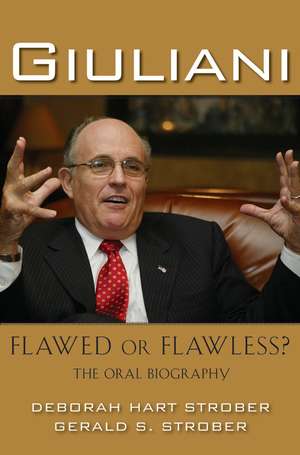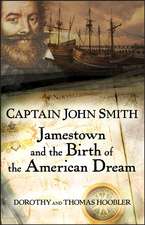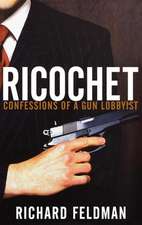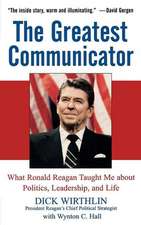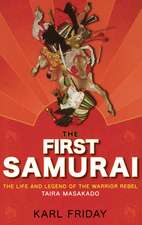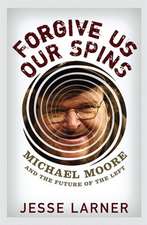Giuliani: Flawed or Flawless? The Oral Biography
Autor Deborah H. Strober, Gerald S. Stroberen Limba Engleză Hardback – 8 feb 2007
Preț: 162.90 lei
Nou
Puncte Express: 244
Preț estimativ în valută:
31.18€ • 32.46$ • 26.35£
31.18€ • 32.46$ • 26.35£
Carte disponibilă
Livrare economică 17 februarie-03 martie
Preluare comenzi: 021 569.72.76
Specificații
ISBN-13: 9780471738350
ISBN-10: 0471738352
Pagini: 332
Dimensiuni: 165 x 239 x 29 mm
Greutate: 0.67 kg
Editura: Wiley (TP)
Locul publicării:Hoboken, United States
ISBN-10: 0471738352
Pagini: 332
Dimensiuni: 165 x 239 x 29 mm
Greutate: 0.67 kg
Editura: Wiley (TP)
Locul publicării:Hoboken, United States
Public țintă
Readers supportive of Giuliani and a potential White House bid; political junkies; public librariesDescriere
The right man in the right place at the worst possible time "Let′s give Rudy credit: he knew that not just the people of the City of New York were going to watch his every move and listen to his every word, but that the entire world was going to be looking to him for guidance, for updates, for information, and Rudy rose to the occasion. Rudy is a seasoned politician with thirty years of law enforcement training to fall back on; he had all of his connections with the Justice Department, with the Police Department, with the law enforcement community, so he was a good mayor to have in place at the time. You were not dealing with just an act of trauma or a terrible act of natural devastation; this was an intentional act of criminal conduct, and he understood not only about preserving the crime scene but doing the rescue operation. He understood that more than other mayors would have, even if they were more popular. Rudy had command of that naturally, based on his experience, and that gave comfort to the world that the person in charge of New York was someone who had brought the Mafia to its knees; who had taken on big business; who was not going to be intimidated. He rose to the occasion and a lot of people who hated him before 9/11 are among his biggest fans now."
Benjamin Brafman, partner, Brafman Associates, PC, from Giuliani
Benjamin Brafman, partner, Brafman Associates, PC, from Giuliani
Textul de pe ultima copertă
The right man in the right place at the worst possible time "Let′s give Rudy credit: he knew that not just the people of the City of New York were going to watch his every move and listen to his every word, but that the entire world was going to be looking to him for guidance, for updates, for information, and Rudy rose to the occasion. Rudy is a seasoned politician with thirty years of law enforcement training to fall back on; he had all of his connections with the Justice Department, with the Police Department, with the law enforcement community, so he was a good mayor to have in place at the time. You were not dealing with just an act of trauma or a terrible act of natural devastation; this was an intentional act of criminal conduct, and he understood not only about preserving the crime scene but doing the rescue operation. He understood that more than other mayors would have, even if they were more popular. Rudy had command of that naturally, based on his experience, and that gave comfort to the world that the person in charge of New York was someone who had brought the Mafia to its knees; who had taken on big business; who was not going to be intimidated. He rose to the occasion and a lot of people who hated him before 9/11 are among his biggest fans now."
Benjamin Brafman, partner, Brafman Associates, PC, from Giuliani
Benjamin Brafman, partner, Brafman Associates, PC, from Giuliani
Cuprins
Acknowledgments. The Interviewees.
PART I: THE SOFTER, GENTLER RUDY GIULIANI.
1 The Mayor s Poignant Last State of the City Address.
2 Who Is Rudy Giuliani?
PART II: BEGINNINGS: BROOKLYN AND LONG ISLAND.
3 A Yankee Fan in God s Kingdom : Bishop Loughlin Memorial High School.
PART III: CRIME BUSTER.
4 From Street–Smart Rudy in the Ivy League Southern District of New York (SDNY) to Number Three in the U.S. Department of Justice and U.S. Attorney for the SDNY: A Smaller Pond in the Swim to City Hall?
5 Prosecutorial Hits and Misses.
PART IV: THE POLITICAL AGENDA.
6 Act One: Rudy the Loser.
7 Act Two, Scene One: Rudy the Winner.
PART V: THE FIRST TERM: JANUARY 2, 1994 DECEMBER 31, 1997.
8 Getting the Giuliani Administration Up and Running.
9 Administrative Style.
10 Hizzoner the Mayor: Saint Rudy or Mussolini on the Hudson?
11 The Mayor and the NYPD.
PART VI: THREE TRAGIC INCIDENTS: THE ISSUE OF EXCESSIVE FORCE BY THE NYPD.
12 Louima.
13 Diallo.
14 Dorismond.
PART VII: THE SECOND TERM: JANUARY 1, 1998 DECEMBER 31, 2001.
15 Act Two, Scene Two: Rudy the Winner.
PART VIII: SEPTEMBER 11.
16 Heroism, Grief, and Decision.
17 Wednesday–Morning Quarterbacking.
18 The Aftermath.
PART IX: LIFE AFTER CITY HALL.
19 Giuliani Partners, or Rudy the Very, Very, Very Rich Man.
20 Gazing into the Crystal Ball: The Presidency in Rudy s Future.
Index.
PART I: THE SOFTER, GENTLER RUDY GIULIANI.
1 The Mayor s Poignant Last State of the City Address.
2 Who Is Rudy Giuliani?
PART II: BEGINNINGS: BROOKLYN AND LONG ISLAND.
3 A Yankee Fan in God s Kingdom : Bishop Loughlin Memorial High School.
PART III: CRIME BUSTER.
4 From Street–Smart Rudy in the Ivy League Southern District of New York (SDNY) to Number Three in the U.S. Department of Justice and U.S. Attorney for the SDNY: A Smaller Pond in the Swim to City Hall?
5 Prosecutorial Hits and Misses.
PART IV: THE POLITICAL AGENDA.
6 Act One: Rudy the Loser.
7 Act Two, Scene One: Rudy the Winner.
PART V: THE FIRST TERM: JANUARY 2, 1994 DECEMBER 31, 1997.
8 Getting the Giuliani Administration Up and Running.
9 Administrative Style.
10 Hizzoner the Mayor: Saint Rudy or Mussolini on the Hudson?
11 The Mayor and the NYPD.
PART VI: THREE TRAGIC INCIDENTS: THE ISSUE OF EXCESSIVE FORCE BY THE NYPD.
12 Louima.
13 Diallo.
14 Dorismond.
PART VII: THE SECOND TERM: JANUARY 1, 1998 DECEMBER 31, 2001.
15 Act Two, Scene Two: Rudy the Winner.
PART VIII: SEPTEMBER 11.
16 Heroism, Grief, and Decision.
17 Wednesday–Morning Quarterbacking.
18 The Aftermath.
PART IX: LIFE AFTER CITY HALL.
19 Giuliani Partners, or Rudy the Very, Very, Very Rich Man.
20 Gazing into the Crystal Ball: The Presidency in Rudy s Future.
Index.
Recenzii
RUDY Giuliani has gone from being America′s mayor to our top political paradox. How could a pro–choice, pro–gay rights, pro–gun control, twice–divorced centrist lead the early polling in the 2008 Republican presidential primaries?
Conventional wisdom says that social conservatives who dominate the GOP primary process just don′t know Rudy′s record. Once they see that the emperor has no clothes – or, rather, likes to wear women′s clothes – his numbers will slip and his prospects will sink.
That line, repeated by Democrats across New York, may prove to be true. But don′t be so quick to write off Rudy. Deconstruct that conventional wisdom, and you find that it rests on shaky premises, knee–jerk biases and, perhaps most importantly, a fundamental misunderstanding of the post–9/11 political climate.
Of course, Giuliani′s had a rough week or two; even if he′s still the front–runner, he′s hardly a sure thing for the nomination. He raised an impressive $10 million in March alone, but keep in mind that his high standing in the polls has a lot to do with the relative weakness of the current field, which could change.
That said, I suspect the "Rudy can′t win" mantra is being driven as much by Democratic fear and loathing – of both conservatives and Giuliani himself – as by Republican politics and performance.
As Deborah Hart Strober and Gerald Strober′s "Flawed or Flawless" amply documents through dozens of interviews with friends and foes alike, liberals widely despise Giuliani. Not just because they see him as a racially insensitive, rights–suppressing bully, but because he succeeded in this big blue city largely because of his hard–charging style, not despite it.
To these liberals, Giuliani winning the GOP nomination is doubly scary: He threatens their worldview – and, worse, as a socially tolerant 9/11 hero, he′s probably the biggest threat to beat the Democratic nominee. So when they say he can′t win, part of what they′re really saying is they don′t want him to win.
More important, though, is how the left sees the right. The way many of my Democratic friends view evangelicals, and conservatives more broadly, is best summed up by the infamous Washington Post mischaracterization "poor, uneducated and easy to command." So in their eyes, what′s wrong with Kansas will prove to be what′s wrong with Rudy′s campaign.
That glib analysis is flawed, though. It treats movement conservatives as an unthinking monolith and wrongly presumes they would never tolerate or nominate a moderate.
Democrats also ignore the conservative appeal of Giuliani′s strong moral streak, which he memorably demonstrated in his 1999 confrontation over the Brooklyn Museum′s controversial "Sensation" exhibit. That′s probably not enough to compensate for his apostasies on abortion and gay rights, but at a minimum it′ll help him connect with some less–doctrinaire primary voters and likely mollify others′ concerns about his cultural profile.
But liberals′ big error here is to dramatically discount the long–term political impact of 9/11. They just don′t see how the terrorist attacks of that day, and the ongoing threat of jihadism, have transformed millions of Americans (especially on the right) into security–first voters. This is the pre–eminent, transcendent issue for this generation of conservatives, and Rudy′s credentials are saint–like.
Remember, conservatives willingly overlooked Ronald Reagan′s divorce at a time when divorce was a much bigger political taboo than it is today. To righties of that generation, fighting Communism was the preeminent, transcendent cause, and Reagan was peerless when it came to waging and winning the Cold War. (It didn′t hurt that he was a tax–cutting zealot, too.)
One of Giuliani′s considerable advantages, much like Reagan, is the president he would replace. Many voters saw Reagan′s strength and clarity as welcome antidotes to Jimmy Carter′s weakness and malaise. To today′s Republicans, Giuliani offers the same tough–on–terror leadership that has bonded conservatives to President Bush. But he also comes with an impressive record as a governmental CEO – a stark contrast to Bush′s bungling on Iraq and Katrina.
Thus, by nominating Giuliani, Republicans would neutralize the competence issue and take divisive social issues off the table – while focusing the debate on their strength, security. It is plausible that a critical mass of Republicans could make such a pragmatic choice and put winning over purity – just as Democrats thought they were doing by picking war hero John Kerry over the unelectable Howard Dean in 2004.
Whether Giuliani′s 9/11 halo is powerful enough to overshadow his cultural deviations and personal shortcomings with enough primary voters to buy him a fair hearing on other issues, like tax cuts and judges and immigration, remains to be seen. But so far, Rudy seems to be on the right track.
Dan Gerstein, a political consultant, formerly advised Connecticut Sen. Joe Lieberman and Nassau County Executive Tom Suozzi. (New York Post, April 8, 2007)
Conventional wisdom says that social conservatives who dominate the GOP primary process just don′t know Rudy′s record. Once they see that the emperor has no clothes – or, rather, likes to wear women′s clothes – his numbers will slip and his prospects will sink.
That line, repeated by Democrats across New York, may prove to be true. But don′t be so quick to write off Rudy. Deconstruct that conventional wisdom, and you find that it rests on shaky premises, knee–jerk biases and, perhaps most importantly, a fundamental misunderstanding of the post–9/11 political climate.
Of course, Giuliani′s had a rough week or two; even if he′s still the front–runner, he′s hardly a sure thing for the nomination. He raised an impressive $10 million in March alone, but keep in mind that his high standing in the polls has a lot to do with the relative weakness of the current field, which could change.
That said, I suspect the "Rudy can′t win" mantra is being driven as much by Democratic fear and loathing – of both conservatives and Giuliani himself – as by Republican politics and performance.
As Deborah Hart Strober and Gerald Strober′s "Flawed or Flawless" amply documents through dozens of interviews with friends and foes alike, liberals widely despise Giuliani. Not just because they see him as a racially insensitive, rights–suppressing bully, but because he succeeded in this big blue city largely because of his hard–charging style, not despite it.
To these liberals, Giuliani winning the GOP nomination is doubly scary: He threatens their worldview – and, worse, as a socially tolerant 9/11 hero, he′s probably the biggest threat to beat the Democratic nominee. So when they say he can′t win, part of what they′re really saying is they don′t want him to win.
More important, though, is how the left sees the right. The way many of my Democratic friends view evangelicals, and conservatives more broadly, is best summed up by the infamous Washington Post mischaracterization "poor, uneducated and easy to command." So in their eyes, what′s wrong with Kansas will prove to be what′s wrong with Rudy′s campaign.
That glib analysis is flawed, though. It treats movement conservatives as an unthinking monolith and wrongly presumes they would never tolerate or nominate a moderate.
Democrats also ignore the conservative appeal of Giuliani′s strong moral streak, which he memorably demonstrated in his 1999 confrontation over the Brooklyn Museum′s controversial "Sensation" exhibit. That′s probably not enough to compensate for his apostasies on abortion and gay rights, but at a minimum it′ll help him connect with some less–doctrinaire primary voters and likely mollify others′ concerns about his cultural profile.
But liberals′ big error here is to dramatically discount the long–term political impact of 9/11. They just don′t see how the terrorist attacks of that day, and the ongoing threat of jihadism, have transformed millions of Americans (especially on the right) into security–first voters. This is the pre–eminent, transcendent issue for this generation of conservatives, and Rudy′s credentials are saint–like.
Remember, conservatives willingly overlooked Ronald Reagan′s divorce at a time when divorce was a much bigger political taboo than it is today. To righties of that generation, fighting Communism was the preeminent, transcendent cause, and Reagan was peerless when it came to waging and winning the Cold War. (It didn′t hurt that he was a tax–cutting zealot, too.)
One of Giuliani′s considerable advantages, much like Reagan, is the president he would replace. Many voters saw Reagan′s strength and clarity as welcome antidotes to Jimmy Carter′s weakness and malaise. To today′s Republicans, Giuliani offers the same tough–on–terror leadership that has bonded conservatives to President Bush. But he also comes with an impressive record as a governmental CEO – a stark contrast to Bush′s bungling on Iraq and Katrina.
Thus, by nominating Giuliani, Republicans would neutralize the competence issue and take divisive social issues off the table – while focusing the debate on their strength, security. It is plausible that a critical mass of Republicans could make such a pragmatic choice and put winning over purity – just as Democrats thought they were doing by picking war hero John Kerry over the unelectable Howard Dean in 2004.
Whether Giuliani′s 9/11 halo is powerful enough to overshadow his cultural deviations and personal shortcomings with enough primary voters to buy him a fair hearing on other issues, like tax cuts and judges and immigration, remains to be seen. But so far, Rudy seems to be on the right track.
Dan Gerstein, a political consultant, formerly advised Connecticut Sen. Joe Lieberman and Nassau County Executive Tom Suozzi. (New York Post, April 8, 2007)
Notă biografică
Deborah Hart Strober and Gerald S. Strober are the authors of His Holiness the Dalai Lama: The Oral Biography and Billy Graham: An Oral and Narrative Biography, both available from Wiley, and four previous oral histories, including Let Us Begin Anew: An Oral History of the Kennedy Presidency and Reagan: The Man and His Presidency. They are longtime residents of New York City.
